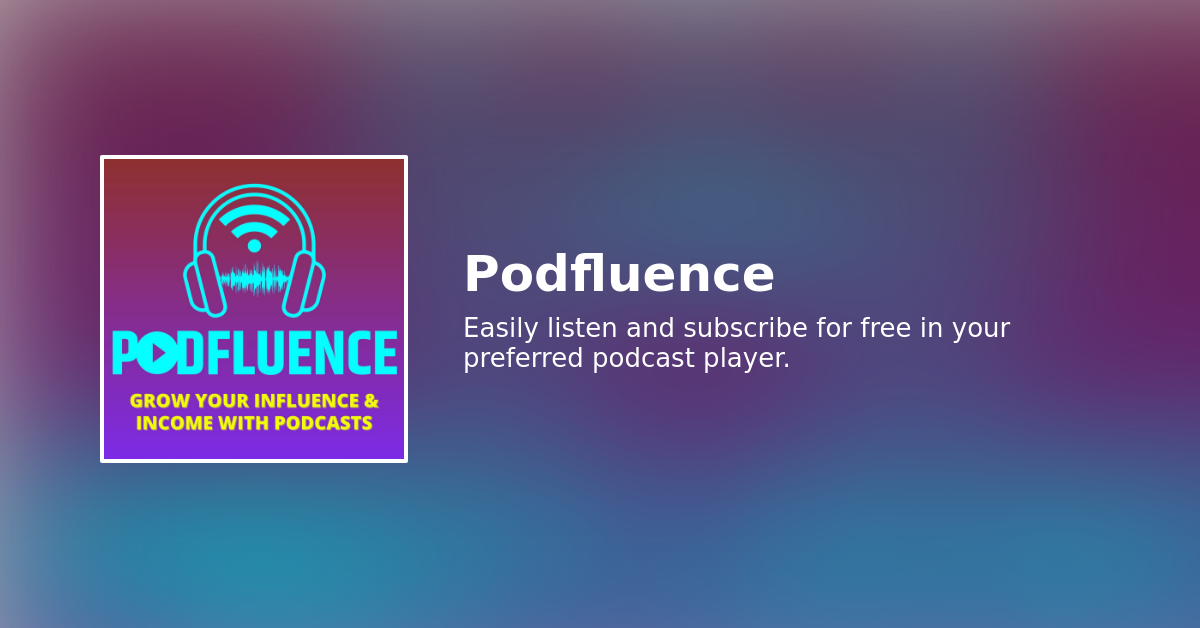
Podfluence Weekly #44
3 simple fixes to avoid the most common mistakes people make as podcast guests.
You can listen to the audio version of this week's Podfluence if you prefer...
Being invited to be an expert guest on someone else’s podcast is quite a privilege and a potential opportunity too. Maybe they asked you, maybe you asked them or the stars just aligned but most of your podcast appearances have the potential to generate new business for you if you play your cards right. Thing is, most people are f***ing it up and they don’t even know it.
So, how do you know if podcast guesting is working as a marketing strategy or not? You can measure your results as you would any marketing campaign, by the amount of opportunity generated. However, unlike most ad campaigns, the results can keep coming on an ongoing basis, and sometimes an initial lack of results does not necessarily mean there will be no results at all.
However, if you’re being strategic with your appearances and getting on shows with bigger audiences that contain your client avatar and not seeing more immediate results, there’s a good chance you’re not making the most of the opportunity and connecting with that audience in a way that would inspire them to know more about you. If you’re not getting results then you’re ultimately wasting your time, the host’s time and the audience’s time too, although they probably won’t be sticking around past a few minutes.
I’ve admitted this before but there are certain guest recordings I felt unable to publish for various reasons and we’re going to address those, although I’ll be painting with a wide brush. Before we get to those, there’s something you need to get about outcome-based podcasting that many podcasters just don’t get: the show needs to be both entertaining and educational. On some level, we all know this.
If we go to the theatre and the show is boring, we’ll probably stay until the end. It’s a mix of sunk cost fallacy (you’ve already paid your money and made the effort to be there) along with probably not wanting to appear churlish by walking out. Those things won't save you on a podcast episode. There’s no sunk cost and the audience owe you nothing. You have everything to prove, which means you need to offer a strong value proposition and then you need to deliver on it.
That’s the context for everything that’s about to follow. I was disappointed to find out some years back that the term edutainment had already been coined and I had not been the first to come up with this handy portmanteau. Non-fiction, outcome-based podcasts need to deliver edutainment the whole time, whether it’s 15 minutes or 60. Forgetting this is fatal for your appearances. You don’t need to become a stand-up comedian delivering a set but you will need to turn up a few dials.
So, here they are:
1. Be present.
Even the most painfully introverted people like to talk about themselves, although some may take more coaxing than others. Most podcasters start their interviews with some variation of “tell us about yourself”. Let’s not get into the right or wrong of that other than to know you’re likely to encounter it a lot.
Responding to that question with your life history or professional history, however potted, is likely to get the audience searching for something else to listen to or at least debating the value of continuing to listen. It’s like an unintentional trap set by the majority of podcast interviewers. If they don’t know who you are, they don’t care about your history. If they do know who you are they probably already know it.
Help your podcast host out by turning this into an opportunity for an interesting and ideally illustrative story that is as short as you can make it and different to the majority of answers they will ever receive. Bonus points if the story is also funny, as long as that’s appropriate to the show.
Stay aware of the host and give them opportunities to interject.
2. Pause for punctuation.
Even professional speakers and comedians can struggle with this one. People worry way too much about dead air and leaving gaps. Most podcasts are edited, and those that aren’t should be. Gaps and pauses are likely to be shortened for you if they’re too long.
The benefits of pausing are threefold, it will give you time to consider your reply rather than just trying to keep on speaking and fill recording time. It provides an opportunity for the host to steer the conversation and it adds gravitas to what you say, as it’s a trait that tends to indicate confidence.
Less really is more. The more succinct you can be in your communication, the more impact you’ll probably have. As with anything, taken to extremes this will have the opposite effect. One-word or super short interview answers suggest you don’t have much to say and that you don’t really want to be there. It can be interpreted as unfriendly and somewhat passive-aggressive. If that’s the case, why are you even there?
The ability to be able to ‘nutshell’ things makes them memorable and brings us to…
3. Prepare yourself.
I’m sure most of us don’t have the time to do anything like the amount of preparation for every podcast interview as we’d like to be able to and that’s OK. You don’t need to hire a research team but you should consider giving some time to your research.
I’ve gone on shows I never should have gone on, simply because I did not take the time to do any research at all. It’s the kind of mistake like a bad drunken tweet made years ago, that may one day come back and bite you.
There are so many things you could prepare yourself with but here are three key things that don’t take too much time:
i. Prepare your energy by getting yourself into a good energetic state. Music, movement and some personal declarations are my own preferred method.
ii. If you haven’t already listened to the show before, look it up, check out a few episodes, and look at the episode titles and show description to be sure you know what you’re doing.
iii. Have a framework you can share that makes it easy for the listener to get what you’re about and how you can help them. It doesn’t need to be complicated. There’s a framework to this episode/article which I’ll recap in a moment.
This framework is 3 Ps: Present, Pause and Prepare. Alliteration is great when you can use it with something like this because it makes things much easier to remember. If you can remember the 3 Ps, you can probably remember most, if not all of what they stand for. Don’t force alliteration though. Rhyming can be great too, or an acronym but if you can’t rhyme or alliterate your framework, 3 key points will do just fine.
We could get into the power of 3 in language and rhetoric but if that kind of thing is interesting to you, take a listen to episode 66 of Podfluence with my guest Simon Lancaster.

